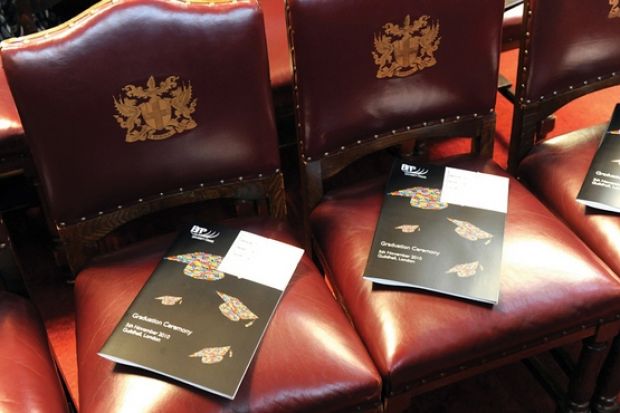Source: Richard Chambury
Valuable places: institutions can profit from university title, but the funding council is concerned about how they may gain this
The government decision to approve the UK’s first for-profit university was hurried through to help meet a deadline in its sale to a private equity firm, a document obtained by Times Higher Education suggests.
According to a paper given to THE under the Freedom of Information Act, the University of Law’s application for university title was approved by correspondence without a full board meeting of the Higher Education Funding Council for England.
The move helped to meet a deadline set by the government so that the institution’s £200 million sale to Montagu Private Equity could be completed. University title was a crucial part of the sale package.
“The sale is contingent on the prior agreement by BIS [the Department for Business, Innovation and Skills] that the College of Law Limited can use the word university in its company name,” says the Hefce board paper, dated 2 November 2012. “If that is not agreed by 30 November 2012 we have been told that [Montagu] has the right to terminate the sale agreement. We do not know…if it would do so.”
The revelation comes as two other privately funded institutions - BPP University College and Regent’s College - are set to gain permission to become universities via the same new process for awarding university title to private providers.
That process - where the title is conferred via the official register of UK firms, Companies House - has sparked concerns at Hefce, according to the board paper.
“There is a risk that [privately funded] providers operate at a lower standard of corporate governance than is expected of institutions that receive public funding, with consequent risks to the ‘brand reputation’ of UK universities,” it warns in a section on “risk implications”.
BPP (owned by the US for-profit firm Apollo Group) and charity Regent’s College are both scheduled to have their applications for university title considered by Hefce at its board meeting on 31 January.
Under the Companies House process, an institution wanting university title lodges its application with BIS before Hefce checks that it meets requirements on student numbers and corporate and financial governance, based on audits commissioned by the applicant itself. The Quality Assurance Agency checks on the existing arrangements for academic governance.
Vince, on your head be it
Hefce’s chief executive Sir Alan Langlands wrote to BIS in October last year setting out “residual concerns” about the process.
He said of Hefce’s role in such applications: “Our assessment will be based entirely on the information and assurances provided by the applicant to BIS without any testing of the information and assurances provided…Consequently our advice to BIS will be limited in the assurance that it can provide.”
Sir Alan added that it was “important to be clear that…the Secretary of State [Vince Cable] will be taking the decision about university or university college title and therefore must accept the risks to the student and public interest arising from that decision”.
In a further letter to BIS, he also signalled his unhappiness about using “correspondence” to meet “the BIS deadline of 8 November” on the University of Law application.
“I hope that future applicants can be advised of the scheduled dates of Hefce board meetings and the timetable for processing applications and our advice,” he wrote.
Since gaining university title and completing its sale to Montagu, the University of Law has appointed three representatives from the firm to its company board, where they will have a say in controlling the institution’s academic authority.
Sir Alan made plain in his letter that Hefce was “not asked for advice on the post-acquisition academic, general and financial governance arrangements to be put in place at the University of Law” by Montagu.
Roger King, former vice-chancellor of the University of Lincoln and author of a 2008 Universities UK report on private institutions and public funding, said “a key matter is the change of ownership and the need to ensure that no changes of policy are envisaged by the new owners that radically change the basis on which the decision on university title is made”.
He added: “This suggests a rather more extended investigation was needed than Hefce was able to undertake. The possible exertion of commercial pressures for [a quick decision] heightens these concerns.”
A BIS spokesman said that university title criteria, “which apply equally to all organisations wishing to apply…are stringent and the application process rigorous”.
Register to continue
Why register?
- Registration is free and only takes a moment
- Once registered, you can read 3 articles a month
- Sign up for our newsletter
Subscribe
Or subscribe for unlimited access to:
- Unlimited access to news, views, insights & reviews
- Digital editions
- Digital access to THE’s university and college rankings analysis
Already registered or a current subscriber? Login




